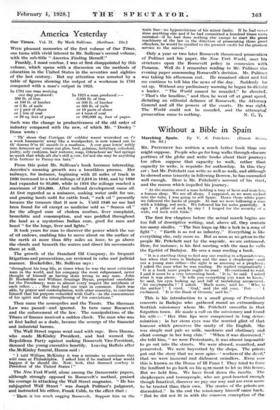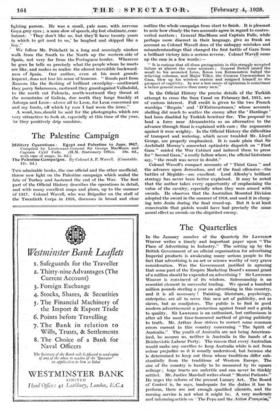Without a Bible in Spain
Marching Spain. By V. S. Pritchett. (Ernest Beni /Os. 6d.)
Mn. ParrenErr has written a much better book than one might suppose. People who go for long walks through obscure portions of the globe and write books about their journeys too often suppose that capacity to walk, rather than capacity to write, is requisite for authorship. In this they err ; but Mr. Pritchett can write as well as walk, and although he showed some temerity in following Borrow, he has succeeded well enough. Here is Mr. Pritchett's account of his start, and the reason which impelled his journey.
" At the station stood a man holding a tray of laces and matches, a human shop. We are all shops. I supposed, as we were sucked into the tube, I was going to sell Spain. Down those white pipes we followed the backs of people. At lest we were following a man with a folding, red neck. We followed his for miles gratefully. A sign Y A pillar of neck by day ? I longed for the security of a wide, red neck with folds."
The first few chapters before the actual march begins are too full of descriptive writing, and, above all, they contain too many similes. " The Sun leaps up like a lark in a song of light " : " Earth is as red as infantry." Everything is like everything else, only more so. But as soon as we get on to the people Mr. Pritchett met by the wayside, we are entranced. Here, for instance, is his first meeting with the man he calls the Egotist of Badajoz. He sees a man reading a book.
" It is a startling thing to find any one reading in a Spanish town, but when that town is Badajoz and the man a shopkeeper--and not a young man either—the sight is as amazing as a prophecy, I asked the man what he was reading. He replied enigmatically ' It is a book more people ought to read.' He continued to read. I said it must be a very interesting book. It is,' he said. I asked what it was about.. It tells you everything you want to know,' ho said, his eyes looking up and full of tantalising amusement. An encylopaedis, ? ' I asked. Much more,' said ho. Who is the author ? I cried. God,' said the old man. ' But---' I exclaimed. It is the Book of Genesis,' said he."
This is his introduction to a small group of Protestant converts in Badajoz who gathered round an extraordinary Scottish missionary whom Mr. Pritchett unearths in that forgotten town. He made a call on the missionary and found his wife :—" Her thin lips were compressed in long deter. mination ; in her stern eyes was the worried glint of that humour which preserves the sanity of the English. She was simple and pale as milk, meekness and obstinacy and silent courage in her long chin." "When it was discovered," she told him, " we were Protestants, it was almost impossible to go out into the streets. We were abused, assaulted, and persecuted. We were boycotted by the shops. The priests put out the story that we were spies—' workers of the devil,' that we were immoral and dishonest swindlers. Even now this is known as the House of ill Fame l They tried to force the landlord to go back on his agreement to let us this house. But we held firm. We have lived down the insults. The shopkeepers and townspeople, who are good-hearted enough though fanatical, discover we pay our way and are even more to be trusted than their own. The stories of the priests are discredited." In the end the missionary himself came back. " But he did not fit in with the common conception of the fighting parson. He was a small, pale man, with nervous Goya grey eyes _; a man slow of speech, shy but obstinate, com- batant: ` They- don't" like us, but they'll haire twenty years in which to get used to us,' he laughed and skipped like a boy y."
We follow. Mr. Pritchett in a long and seemingly aimless walk from the South to the North up the western side of Spain, not very far from the Portuguese border. Wherever he goes he tells us precisely what the people whom he meets are like, and makes us realize the almost incredible backward- ness of Spain. Our author, even at his most grandi- loquent, does not lose his sense of humour. " Roads part from Zamora like the flashing of brilliant swordplay—southward they parry Salamanca, eastward they. guard against Valladolid, to the north. cut Palencia, north-westward they thrust at the mountains of Galicia, due north they lunge frankly at Astorga and Leon—above all to Leon, for Leon concerned me and my boots, off which by now I had worn the irons."
A word, too, shatild be said for the photographs, which are very attractive to look at, especially at this time of the year, or they positively drip sunshine.







































 Previous page
Previous page